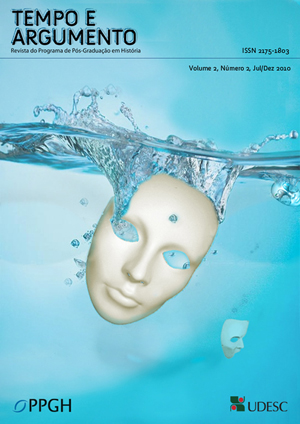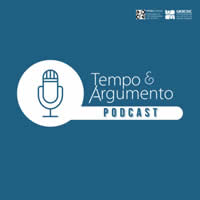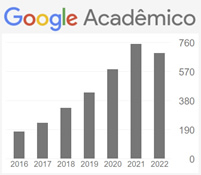Homoerotic sociability and identity relations: the case of journal o snob (Rio de Janeiro, decade of 1960)</em>
DOI:
https://doi.org/10.5965/2175180302022010061Keywords:
homosociability, gender identities, segregated spaces, gaypressAbstract
This paper studies a homoerotic sociability network in Rio de Janeiro in the decade of 1960 through an analysis of reports contained in the journal "O Snob" (1963-1969) produced by a group that formed this network and that circulated among its participants. This is an investigation of identity constructions that those characters held in a sociability area segregated by the larger society but, at the same time, in dialogue with it. Analyzing issues commented internally by these groups with the backdrop of the prevailing norms of heterocentric behavior in the period, I identified the existence of original experiments in search of a "normal homosexual body". Sociosexual changes promoted by these experiments reflected in their sociability spaces and in sexual partnerships, facilitating the emergence of new sexual and/or emotional possibilities. So, I try to demonstrate that the form of integration undertaken by the study groups was directly linked to an inflexibility of gender roles of the time, and, over time, it started to detach from this rigidity in order to built new ways of acting. The study of the peculiar trajectory of groups that formed the network, linking it to the identity movements of the time, can contribute to discussions of individual rights history, specifically the struggle for sexual equality, and the debate over gay occupying spaces.
Downloads
References
CÂMARA, C. Cidadania e orientação sexual: a trajetória do grupo Triângulo Rosa. Rio de Janeiro: Academia Avançada, 2002.
COSTA, J. F. A inocência e o vício: estudos sobre o homoerotismo. Rio de Janeiro: Relume-Dumará, 1992.
COSTA, R. S. M. Sociabilidade homoerótica masculina no Rio de Janeiro na década de 1960: relatos do jornal O Snob. Rio de Janeiro: Programa de Pós Graduação de História, Política e Bens Culturais (PPHPBC); Centro de Pesquisa e Documentação de História Contemporânea do Brasil (CPDOC); Fundação Getulio Vargas (FGV), 2010. Disponível em: http://virtualbib.fgv.br/dspace/bitstream/handle/10438/6564/CPDOC2010Rog%C3%A9rioSMartinsCosta.pdf?sequence=1.
ERIBON, D. Reflexões sobre a questão gay. Rio de Janeiro: Companhia de Freud, 2008.
FRY, P. Para inglês ver: identidade e cultura na sociedade brasileira. Rio de Janeiro: Zahar, 1982.
GAGNON, J. H. Uma interpretação do desejo: ensaios sobre o estudo da sexualidade. Rio de Janeiro: Garamond, 2006.
GOFFMAN, E. Estigma: notas sobre a manipulação da identidade deteriorada. Rio de Janeiro: Livros Técnicos e Científicos, 1988.
GUIMARÃES, C. D. O homossexual visto por entendido. Rio de Janeiro: Garamond, 2004.
GREEN, J. N. Além do carnaval: a homossexualidade masculina no Brasil do século XX. São Paulo: Unesp, 1999.
MACRAE, E. A construção da igualdade: identidade sexual e política no Brasil da abertura. Campinas: Unicamp,1990.
MISSE, M. O estigma do passivo sexual: um símbolo de estigma no discurso cotidiano. Rio de Janeiro: Achiamé, 1979.
SILVA, J. F. B. Homossexualismo em São Paulo: estudo de um grupo minoritário.In: GREEN, J.; TRINDADE, R. (Org.). Homossexualismo em São Paulo e outros escritos. São Paulo: Unesp, 2005. p. 41-177. Primeira edição publicada em 1957.
VANCE, C. S. A antropologia redescobre a sexualidade: um comentário teórico. Phisis: Revista de Saúde Pública. Rio de Janeiro: UERJ-IMS, v. 5, n. 1, 1995. p. 7-31.
Downloads
Published
How to Cite
Issue
Section
License
Copyright (c) 2010 Tempo e Argumento

This work is licensed under a Creative Commons Attribution-NonCommercial 4.0 International License.
The articles published by the magazine are for free use, destined for educational purposes and not commercial. The copyrights are all granted to the magazine. The articles whose authors are identified represent the expressed opinion of its authors and not the official position of the Tempo e Argumento magazine or of the Postgraduate Program in History of the Universidade do Estado de Santa Catarina.




